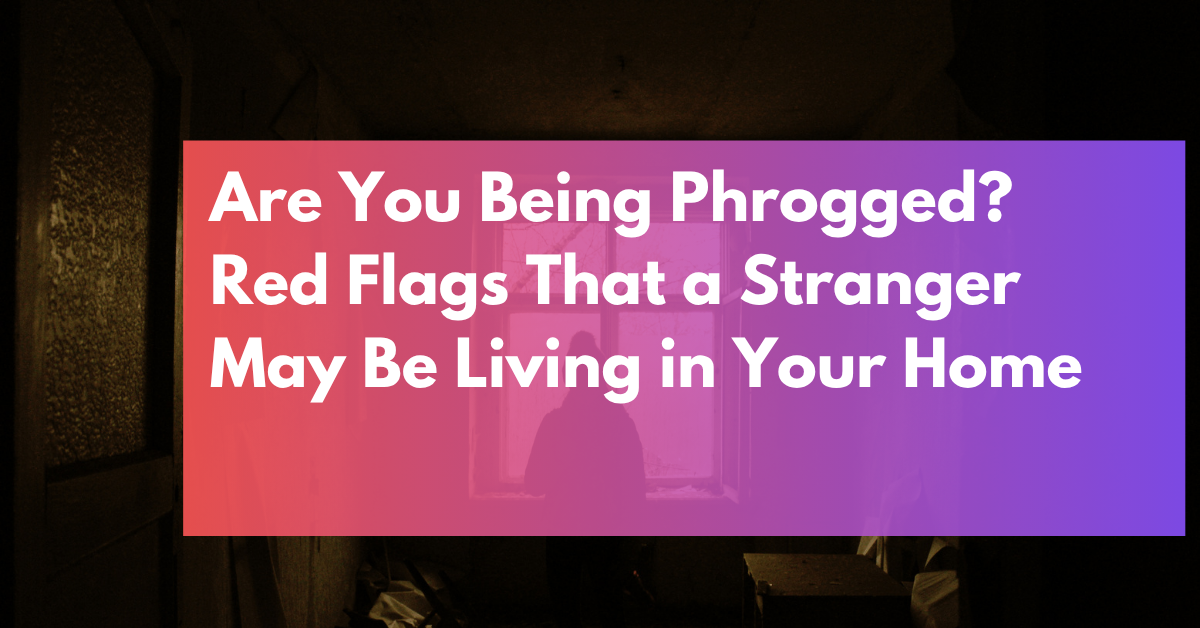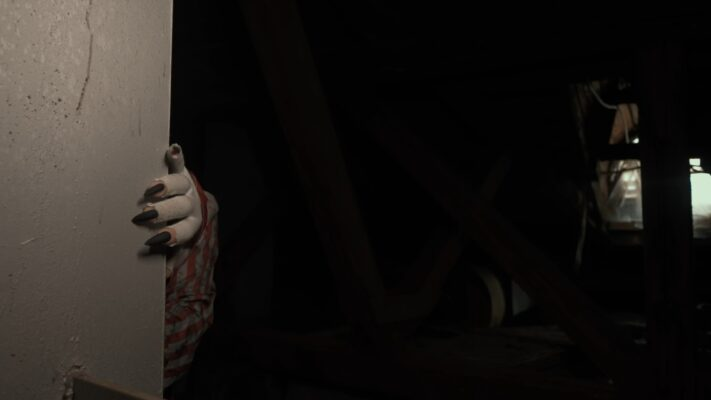Are You Being Phrogged? Red Flags That a Stranger May Be Living in Your Home

- Info and Tips
Are You Being Phrogged? 7 Warning Signs to Watch Out For
Living in your own home should feel normal. But when food goes missing, lights turn on by themselves, or things aren’t where you left them — something’s wrong. These aren’t just small annoyances. In some cases, they’re signs of phrogging.
It’s rare, but it happens. And the scariest part? Many people don’t realize it until weeks or even months later.
Here are the red flags that could mean someone else is already inside your home.
#1. Items Keep Moving or Going Missing
You know where you left your keys. Or your charger. Or that snack you were saving. But suddenly, it’s not there. At first, it’s easy to blame yourself — maybe you misplaced it, maybe someone else in the house moved it.
But when it keeps happening, and no one knows why, it becomes harder to ignore.
In many phrogging cases, victims report small changes they brushed off as forgetfulness. A TV remote left in a weird spot. Clothes thrown on the floor when no one was home. Even drawers or cabinets opened when they remember closing them.
Phroggers usually try to stay hidden, so they’ll only move around when no one is around. But they still need to eat, drink, use the bathroom — and that means disturbing your space. If you’re noticing unusual changes that keep repeating with no clear explanation, it’s time to take it seriously.
Keep track of items. Set things in specific places and see if they’re moved. Use a phone camera or a motion sensor if needed. Small signs are often the first clues — and catching them early can stop a much bigger problem.
#2. Strange Noises When You’re Alone
Hearing a noise in the house is normal — a door creaks, a floorboard pops, or a pipe rattles. But if you keep hearing footsteps, whispers, or faint bumps and knocks when no one else is home, it’s not just an old house. That could be a sign someone is secretly living inside.
Phroggers tend to hide in attics, basements, storage rooms, or even inside walls. When they think the coast is clear, they’ll move around quietly. You might hear soft walking, something falling, or a door closing — all things easy to dismiss once or twice. But when it happens over and over, especially late at night or during the day when everyone’s out, it’s worth paying attention.
If the noises are always coming from the same area — like the attic or a rarely-used room — that’s a red flag. Some people install cameras or motion sensors to catch what’s going on. Others place tape on doors or objects to see if they’ve been moved.
Don’t ignore strange sounds just because they’re hard to explain. Repeated noises without a source are one of the most common signs reported in phrogging cases.
#3. Unlocked Doors and Windows You Know You Closed

Image Source: Bay Management Group
You lock the front door every night — it’s a habit. You shut the windows before bed. But then, the next day, a window is cracked open. A back door is unlocked. At first, it feels like a mistake. But when it keeps happening, it starts to feel disturbing.
Phroggers often sneak in through unlocked windows, basements, or garages. If they’ve already entered, they might leave a door unlocked to make it easier to come and go without being noticed. Some even carry duplicate keys if they’ve been inside long enough to make copies.
If you’re finding doors or windows open that you’re sure were closed, take it seriously. This isn’t just a safety risk — it could be a sign someone is moving in and out without your knowledge.
Start keeping track of every lock before bed. Make a checklist if needed. Some people use chalk marks, tape, or small objects placed in doorways to see if something’s been moved. Others install smart locks or sensors.
One of the earliest signs of phrogging is access — and that often shows through changes in locks and entry points. Don’t ignore it.
#4. Food Disappears Faster Than Usual
Groceries don’t last like they used to. Snacks you clearly remember buying are gone. Milk runs out too quickly. You start noticing things missing from the fridge or pantry — even full meals that were there the night before.
This is a major red flag. Phroggers live quietly, but they still need to eat. Most will sneak into the kitchen when they think the house is empty or late at night. They’ll take small amounts to avoid being noticed — a slice of bread here, a bit of cereal there — but over time, the pattern becomes obvious.
If you live alone or with someone who’s just as confused, the situation becomes even clearer. Start tracking what you buy and when. Keep certain items in specific spots to see if they’re being moved. Some people even set up hidden cameras in the kitchen to confirm what’s going on.
Food is hard to hide. And while phroggers are careful, they can’t avoid leaving a trace forever. If groceries keep disappearing and no one can explain it — someone else might be helping themselves without your knowledge.
#5. Utility Bills Are Higher Without a Reason
If your electricity, water, or gas bill suddenly jumps — and your usage hasn’t changed — that could be a quiet sign someone else is using those services too. Phroggers often hide during the day and move around at night, using lights, showers, and kitchen appliances. Over time, it adds up.
A hidden guest might be charging devices, leaving lights on in unused spaces, or even running small heaters or fans. Most homeowners don’t check attics, basements, or guest rooms daily, so these areas can become unnoticed hiding spots where energy is being used without anyone realizing.
Start reviewing your bills closely. Compare them to previous months. Check the daily usage pattern if your provider offers it. Walk through the house during times you wouldn’t expect activity — you might notice warm spots in unused rooms, faint noises, or lights turned on where they shouldn’t be.
#6. Pets Are Acting Strangely
Animals notice things humans often miss. If your pet is barking at empty rooms, staring at walls, or growling at spaces like the attic or basement — don’t brush it off. Cats may hiss at a hallway, dogs may refuse to enter a room they used to love. That behavior means something.
In many phrogging cases, pet owners say their animals started acting anxious or protective for no clear reason. Some even avoided certain areas completely. Pets can sense movement, unfamiliar smells, or noises that you might not hear. What seems like “weird” behavior could actually be your pet responding to an intruder they can’t reach.
If your pet’s habits suddenly change, pay attention. Start logging when and where they react. Does it happen at the same time each night? Is it always in a specific part of the house? Those patterns can offer clues.
#7. Someone Has Been Using Your Bathroom
This one often gets overlooked, but it’s a major clue. If the toilet seat is up when no one left it that way, towels are wet, or you notice soap running low faster than usual — something’s wrong. In some cases, people have even found hair in the tub that clearly doesn’t belong to anyone in the house.
Phroggers often sneak into bathrooms when the coast is clear. They use the toilet, take quick showers, or brush their teeth — anything to maintain some sense of comfort while hiding out. But they rarely clean up after themselves fully.
Keep an eye on little things: is the toilet paper running out too fast? Is the shower mat damp during times it shouldn’t be? Did the bathroom smell like someone just used it, but no one did?
These small signs are easy to miss, but together they build a clear picture. Your bathroom should only show signs of the people who live there. If something feels off, it’s worth checking deeper.
Conclusion
Most people don’t expect someone to secretly live in their home — but phrogging does happen, and it’s often missed until it’s too late. Strange sounds, missing items, or doors that seem out of place might not just be in your head.
If something feels off, don’t ignore it. Trust your instincts, check your space, and take small steps to stay safe — like changing locks, checking crawl spaces, or setting up a camera.
You don’t need to panic, but being aware is the first step. It’s your home — and you have every right to know who’s in it.
FAQs
Am I being phrogged?
If you’re hearing strange noises around the house—like footsteps, bumps, or movement—but can’t explain where they’re coming from, it might be time to take a closer look. While homes do make sounds, especially at night, repeated and unfamiliar noises during the day or night could be a sign that someone else is secretly inside.
How does phrogging happen?
Phrogging happens when someone sneaks onto your property and secretly lives there without permission. It usually occurs in homes with attics, basements, garages, or other hidden areas where someone can hide out. In some cases, it even happens in empty rental units or vacation homes in between guests or tenants.
How common is phrogging?
Phrogging isn’t something that happens every day, but it’s not just a rumor either. Although rare, real cases have been shared in the news and on social media. It’s unusual — but it’s still possible — so it’s good for homeowners and renters to stay aware and cautious.
What is a phrog?
A phrog is a person who secretly lives in someone else’s home without their knowledge or permission. They hide, often using spaces like attics, closets, or crawl spaces, and try not to be seen or heard. The name “phrog” comes from the idea of someone hopping from one home to another, like a frog.